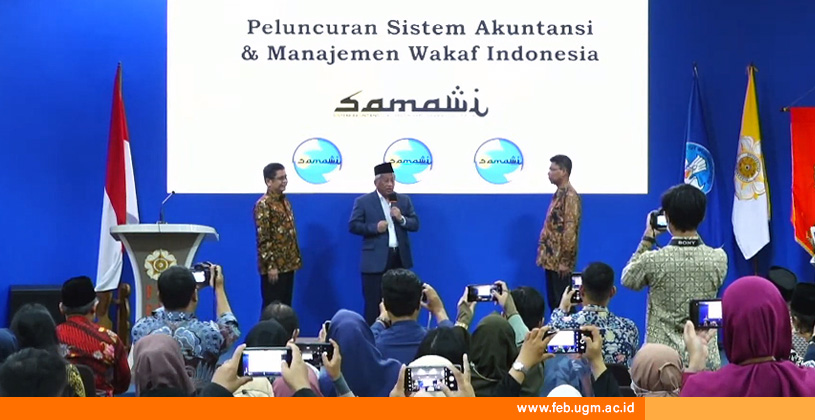Mapping Potential Prospects of Islamic Philanthropy: BWI and UGM Holds the Launch of the SAMAWI Application
- Details
- Written by Hayfaza
- Category: News
- Hits: 633

In the purpose of supporting and sustaining the effectiveness and accountability of Waqf throughout Indonesia, on Tuesday (13/6), the Faculty of Economics and Business, Universitas Gadjah Mada (FEB UGM), in collaboration with the Indonesian Waqf Agency (BWI), holds a launching activity for the SAMAWI Application (Accounting and Accounting System). Indonesian Waqf Management) and Waqf Seminar on the 8th Floor of the FEB UGM Learning Center Building.
The Vice Rector for Human Resources and Finance, Prof. Supriyadi, M.Sc., PhD, CMA., CA., Ak initiated the launch. Prof. Supriyadi underlined the urgency of waqf management and UGM's contribution to the national endowment. Then, Prof. Dr Ir. H. Mohammad Nuh, DEA, as Chair of the BWI Executing Body, delivered a keynote speech regarding the urgency of an endowment fund, one of which in Islam is Waqf, at PTN-BH. Prof. Nuh also underlined BWI's efforts to continue to support productive and growing Waqf, not forgetting Prof. Nuh explained that PTN-BH in Indonesia had started allocating funds for Waqf and hoped that UGM would follow suit soon.
After the remarks and keynote speech, the Samawi application was symbolically launched by Prof. Supriyadi, Prof. Noah, and Prof. Mahfud, accompanied by applause from the audience. Then, the event moved on to the Waqf Seminar session, which Muhammad Akbar Fadzkurrahman Annahl, M.Sc., FEB UGM Lecturer, moderated. In this session, Dr Imam Teguh Saptono, Deputy Chairperson of the BWI Executing Agency, explained comprehensively and prospectively the concept of Waqf, which is in line with the investment concept, namely that Nazir will endeavour to increase Return on Equity (ROE). Nazir also acts as a trustee as well as an investment manager, providing benefits for the waqif as well as marque alaih. However, Prof. Imam Teguh also explained his concern regarding Nazir's reporting as an individual or an organization, which still needs to be recorded in an integrative, aggregated and integrated manner in BWI data. Prof. Mahfud will then assess this through the Samawi application. Prof. Imam Teguh ended his presentation with hopes, based on statistics, that in 2030, Indonesian millennials will implement Islamic philanthropy that will make them happy, one of the main instruments being through Waqf.
Prof. Mahfud Sholihin, PhD, Ak., CA., CPA (Aust)., Professor of the Faculty of Economics and Business UGM, continued this session by explaining the Samawi usage scenario, which is as simple as a status update. Prof. Mahfud started his presentation by introducing Samawi, its relation to PSAK112, and its functionality which mainly includes Waqf reporting, automatic aggregation and journaling, and data integration with BWI. Prof. Mahfud also explained the existence of Samawi-Edu in the form of a learning management system (LMS) for educational purposes. Prof. Mahfud then explained the Samawi tutorials and pages that the audience could try directly. Prof. Mahfud as the initiator of Samawi, also explained that the flow of this application was sequential from reception - management - to the distribution of benefits; all processes can be inputted easily and automatically, have been classified into debit and credit, and recorded in journals and ledgers. After the session, Prof. Mahfud Akbar, as the moderator, opened the question and answer session, which the audience attended with great enthusiasm. The speakers discussed and answered various practical problems by Nazir and Wakif. The end of the question and answer session ended this event and closed with a documentation session.
Reportage: Hayfaza Nayottama
Watch the full video at https://www.youtube.com/live/9IidyW4NBIs


